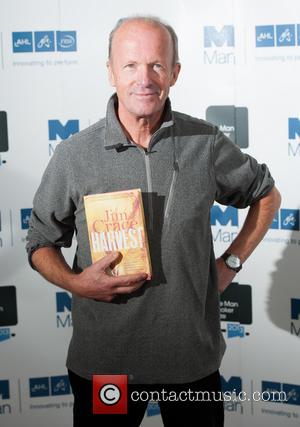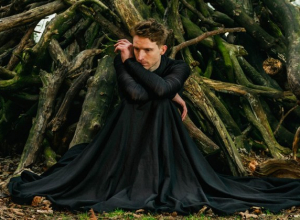Eleanor Catton Becomes The Youngest Ever Man Booker Prize Winner
By Joe Wilde in Books / Authors on 16 October 2013
The 28-year-old won the coveted award for fiction with her second novel, 'The Luminaries'
New Zealand-born author Eleanor Catton made history on Tuesday night (October 15) by becoming the youngest ever winner of the Man Booker Prize for her novel The Luminaries. The 28-year-old beat off competition from a number of more established authors to become the youngest winner of the prize for fiction in it's 45-year history. Not only did Catton make history by being the youngest author to win the award, but at 832-pages, the young writer also holds the record for longest work to receive the award.

Catton beat off competition from six other authors
The 19th century-set murder mystery - which is set during the New Zealand gold rush - earned the author £50,000 in prize money and also made Catton only the second author from New Zealand to win the award. Keri Hulme won the awards in 1985 with her first and only novel, The Bone People.
"It's a dazzling work. It's a luminous work. It is vast without being sprawling," Robert Macfarlane, chair of the Man Booker judges said following the win (via the BBC). "You begin it and you think you are in the clutches of a big baggy monster. "We have returned to it three times now and we have dug into it - to use its own metaphors - and the yield it has offered at each new reading has been extraordinary."
The prize was presented by Camilla, Duchess of Cornwall and Catton's win saw her emerge victorious against favourite for the award Jim Crace. Crace had been strongly tipped to take home the award since the nominees were first announced, however a strong surge in interest in the book and "just under two hours of pretty tough discussion" ensured that Catton went home with the award.


Favourite Crace and Ozeki were among the competiton
Along with Crace's Harvest and Catton's novel, there were four other contenders for the award for fiction. NoViolet Bulawayo's We Need New Names, Jhumpa Lahiri's The Lowland, Colm Toibin's The Testament of Mary and A Tale For The Time Being by Ruth Ozeki were also up for the award. All six shortlisted novelists took home £2,500 and a hardcover edition of their work, with Catton winning an additional £50,000.
This year's award marks the final occasion when the prize will be awarded solely to writers from within the Commonwealth. Next year the award will become open to writers from across English speaking borders, a move that has gained strong criticism from many who fear it will result in a domination by American authors in future shortlists. Organisers for the prize have countered the arguement, saying it will open the prize up to a wider audience, and in doing so will make the books in contention for the award open to a wider readership.

Could the decision to open up the nominees list result in a lack of recognition for authors from smaller countries like New Zealand?
Contactmusic
Suggested

Leisure Festival - Dreamland in Margate
On the same day that Glastonbury welcomed back Margate's adopted sons, The Libertines, Margate itself put on it's very own Leisure Festival as it...

Pretty Fierce talk to us about collaborating with Doja Cat, emetophobia, arena tours and staying "true to yourself" [EXCLUSIVE]
Sheffield's very own all girl group Pretty Fierce are still on a high after the recent release of their debut single - 'Ready For Me'.

Will Varley & Jack Valero - The Astor Theatre Deal Live Review
Three nights before the end of his current tour Will Varley returned to his home town of Deal to delight a sold out crowd in The Astor Theatre.

WYSE talks to us about her "form of synaesthesia", collaborating with Radiohead's Thom York and the prospect of touring with a band [EXCLUSIVE]
With only a few days to go before Portsmouth based songstress and producer WYSE releases her new single, 'Belladonna', we caught up with her to find...
Advertisement

Bay Bryan talks to us about being a "wee queer ginger", singing with Laura Marling and being inspired by Matilda [EXCLUSIVE]
Colorado raised, Glasgow educated and Manchester based Bay Bryan is nothing if not a multi-talented, multi-faceted artist performing as both...

Keelan X talks to us about staying true to "your creative vision", collaborating with Giorgio Moroder and being "a yoga nut" [EXCLUSIVE]
Former Marigolds band member Keelan Cunningham has rediscovered his love of music with his new solo project Keelan X.
![Luke De-Sciscio talks to us about having the courage to be yourself, forgiving that which is outside of one's control and following whims [EXCLUSIVE] Luke De-Sciscio talks to us about having the courage to be yourself, forgiving that which is outside of one's control and following whims [EXCLUSIVE]](https://images.contactmusic.com/images/home/homepage/luke-de-sciscio-abof-a.jpg)
Luke De-Sciscio talks to us about having the courage to be yourself, forgiving that which is outside of one's control and following whims [EXCLUSIVE]
Wiltshire singer-songwriter Luke De Sciscio, formally known as Folk Boy, is set to release is latest album - 'The Banquet' via AntiFragile Music on...

Annie Elise talks to us about the challenges a female producer has to face and "going through a year of grief and sickness" [EXCLUSIVE]
Electronic music pioneer and producer Annie Elise says that the release of her first EP - 'Breathe In, Breathe Out' feels "both vulnerable and...
Advertisement
